Archive for August 6th, 2013
Premier appoints new press secretary
(CNS):The former editor of The Caymanian Compass has been appointed as the new press secretary for the premier’s office. Tammie Chisholm has taken up the post previously held by Charles Glidden during McKeeva Bush’s tenure as well as the six month term of Juliana O’Connor-Connolly. When he took up office following the May General Election, the new premier, Alden McLaughlin, said he was restructuring the politically appointed staff in the premier’s office in an effort to cut headcount. He also indicated that drivers and other trappings of office would be reduced. However, over the last few months Roy Tatum has been appointed as senior political advisor to the premier and Kenneth Bryan as political assistant to the premier.
So far, there has been no official release relating to the departure of Charles Glidden and the appointment of the former Compass editor, who started the job as the new press secretary on Monday 5 August.
Chisholm’s departure from the islands’ oldest and only daily newspaper comes in the wake of the purchase of the paper by David and Vicki Legge of Pinnacle Media. David Legge stepped into the role of publisher and editor in chief soon after the estimated $12 million deal was struck. Since then, Jeff Brammer and Norma Connolly have been appointed as managing editors.
Port board conflict denied
(CNS): The premier’s office has denied any conflict regarding the new Port Authority Board and the appointment of Gerry Kirkconnell, the MD of Kirk Freeport, as the deputy chair, despite his obvious interest in the main issue of the cruise berthing facilities that will occupy the board of directors over the coming months. Officials said they were “lucky to have him” in defence of his appointment. Government officials have also now confirmed that Errol Bush will be the new chair of the important board, with Kirkconnell as deputy and the Chamber of Commerce representative. In addition, Arek Joseph, Woody DaCosta, Robert Foster and Jacqueline Scott will join existing member Ashton Bodden alongside the official members.
Bush, who will lead the board as it begins the process of issuing a formal request for proposals for the development of cruise berthing facilities in George Town, has considerable experience, having been the Port Authority managing director for almost twenty years before he retired from the public sector in 2001.
He was also a director of the International Association of Ports and Harbours and a board member on the American Association of Port Authorities. In recent years, Bush helped in the Turks and Caicos Islands with the bid there for a proposed port project, which will stand him in good stead as the new board begins to negotiate the proper processes for the much anticipated development.
Gerry Kirkconnell is the managing director of Kirk Freeport, with numerous downtown businesses serving cruise passengers that stand to gain significantly from the development of berthing facilities, especially given the statement by the current tourism minister, Moses Kirkconnell, that the project will be limited to just piers and no retail components to compete with downtown merchants.
Despite his clear interest, a statement from the premier’s office in response to questions from CNS dismissed the question of any conflict. “He is a business person and is not the first businessman or large merchant to be on the Port Authority Board," the premier's press secretary said.
“He understands the importance of the cruise business and while his business does depend on the port development, it is no more so than any number of other businesses in the Cayman Islands. Gerry is a respected businessman and there are other very capable business people on the board, including a very experienced and respected chairman, Mr Errol Bush,” she added in defence of the appointment.
“It is important that we have people on the board who are familiar with the cruise industry and are business savvy. Given of the size of the Cayman Islands and the number of people who do business with the cruise industry on a regular basis, finding someone of Mr Kirkconnell's calibre who is willing to put in the time to serve his country is difficult, at best. We're lucky to have him,” the premier’s new press secretary said.
As a result of the board shake-up, the appointments of the former chairman, John Henry Ebanks, deputy chair Carlon Powery, James Bodden, Curly Evans, Rudolph Garvin and Anthony Akiwumi have been revoked.
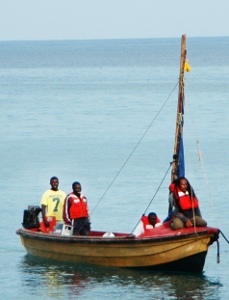
Rescued boaters in custody
 (CNS): Four men who were intercepted and rescued off the eastern coast of Grand Cayman by the Joint Marine Unit around 5:00 on Tuesday morning have been taken into custody, officials have reported. The men, three from Belize and the fourth from Jamaica, were discovered in a canoe some five miles off East End after they called for emergency assistance. The engine on the 27-foot vessel is believed to have either run out of fuel or malfunctioned, the authorities stated. The migrants were refused entry and taken into custody because they gave conflicting stories about how they arrived in Cayman’s territorial waters, officials stated. (Photos by Lennon Christian GIS)
(CNS): Four men who were intercepted and rescued off the eastern coast of Grand Cayman by the Joint Marine Unit around 5:00 on Tuesday morning have been taken into custody, officials have reported. The men, three from Belize and the fourth from Jamaica, were discovered in a canoe some five miles off East End after they called for emergency assistance. The engine on the 27-foot vessel is believed to have either run out of fuel or malfunctioned, the authorities stated. The migrants were refused entry and taken into custody because they gave conflicting stories about how they arrived in Cayman’s territorial waters, officials stated. (Photos by Lennon Christian GIS)
No further details have yet been given and it is not clear if the men were suspected of carrying any illegal contraband, such as drugs or firearms, or whether they have been detained as illegal economic migrants.
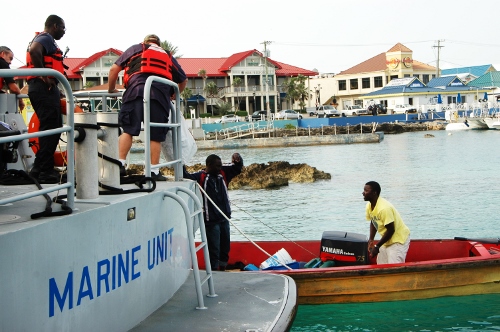
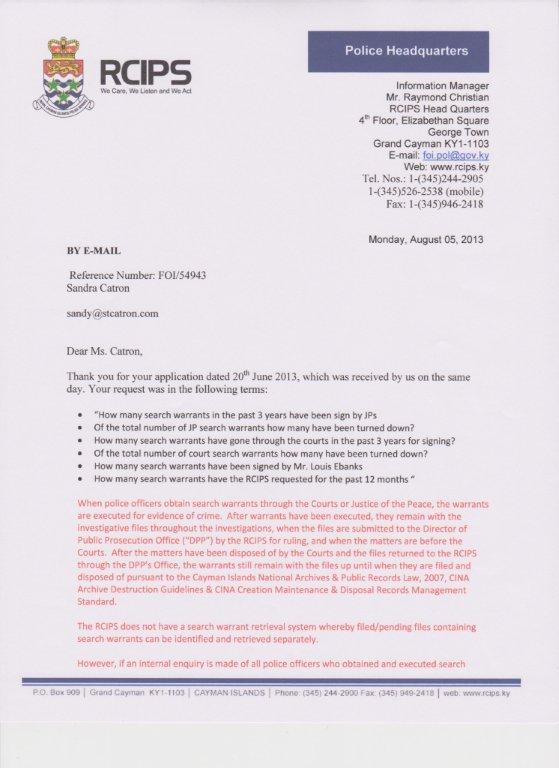
Number of questionable warrants unknown
 (CNS): Following shocking revelations in a recent court case that a justice of the peace had signed a police warrant without having a clue what it was for, what the crime was or seeing any evidence to support it, concerns have been raised that there may be many more such examples. However, an FOI request to the RCIPS reveals that the police have no record system dealing with what warrants have been signed and by whom, as each one is attached to the criminal case file. The RCIPS has told an applicant looking for details of who has signed warrants and why over the last three years that her request was being was refused on the grounds that the police would have to search through more than 8,500 files to try and comply.
(CNS): Following shocking revelations in a recent court case that a justice of the peace had signed a police warrant without having a clue what it was for, what the crime was or seeing any evidence to support it, concerns have been raised that there may be many more such examples. However, an FOI request to the RCIPS reveals that the police have no record system dealing with what warrants have been signed and by whom, as each one is attached to the criminal case file. The RCIPS has told an applicant looking for details of who has signed warrants and why over the last three years that her request was being was refused on the grounds that the police would have to search through more than 8,500 files to try and comply.
The request made by Sandra Catron, the local activist who exposed the fact that a warrant used for her arrest and to search her home, office and car in an abuse of an ICT network case was fundamentally flawed because the JP not understand the alleged crime, he was given no evidence and he did not swear the oath but merely signed the warrant at the request of the officers. The man also admitted that in more than two decades as a JP he had never refused to sign a warrant.
This has raised concerns that many other warrants may have been signed in similar circumstances. While the Commissioner of Police David Baines has now changed the procedure regarding warrants, the revelation means that could be many, many more arrest warrants that were not properly executed and may have been signed by the same JP or others who were not aware of the law, had not seen any evidence or had not sworn an oath. This means that hundreds of arrests, charges and ultimatelyconvictions could be called into question if it was found that warrants were obtained unlawfully.
Despite the possibility of hundreds of flawed warrants, the police do not know how many warrants may have been signed by the JP in the Catron case or by other JPs who may be equally unaware of the law surrounding warrants and under what circumstances they should be signed.
However, when Catron submitted her request for details of warrants for just the last three years that had been signed by JPs, the RCIPS information manager said that the police did not keep a warrant record system. He explained that the warrants were attached to the criminal case files and that is where they stay as they wind through the justice process and then into the archives.
“After warrants have been executed they remain with the investigative files throughout the investigation, when files are submitted to the Director of Public Prosecutions office by the RCIPS for ruling and when the matters are before the courts,” said Raymond Christian, the RCIPS information manager. He said that after the matters have been disposed of by the courts and the files are returned to the RCIPS through the DPP’s office, the warrants remain with the files until they are filed in accordance with the Cayman Islands National archives and public records law.
Christian explained in a letter to the applicant (see below) that the RCIPS does not have a search warrant retrieval system where warrants can be identified and retrieved separately. If an internal enquiry was to be made of all police officers who obtained and executed search warrants going back three years, the information may not be accurate because officers have left the service, he said. Between June 2010 and June 2013 the police recorded a total of 8,567 separate crimes.
“In order for us to accurately answer your question we would have to physically search through about 8,567 files, which would unreasonably divert our resources,” the police information boss told the applicant, as he cited the section of the FOI law under which he was refusing the request.
After the court found that the Catron warrant was flawed and the arrest and search unlawful, the judge paved the way for Catron to apply for damages, which will come from the public purse. The revelation that there could be a large number criminal case files stored by the police with warrants attached to them that no one can say for sure were executed correctly could lead to many arrests being called into question.
Following the response from Christian refusing her request, Catron told CNS that she was considering her options and may request an internal review.
Related articles on CNS:

HFC donates UD$250,000 to child abuse charities
 (CNS): Hedge Funds Care (HFC) Cayman, a charity for the prevention and treatment of child abuse, has allocated a total of US$250,000 in local grants this year to seven local charites that work to raise awareness in order to prevent abuse or to support abused children in the Cayman Islands. Programmes that will benefit include those that educate the public, young parents, teachers and health workers, as well as child abuse prevention education for young children at school. Hedge Funds Care Cayman was founded in 2005 as the second international affiliate of HFC. Since then, the Cayman affiliate has distributed over US$1.8 million in 47 grants to agencies and organisations in the Caymans Islands that work to prevent and treat child abuse and neglect, Hedge Funds Care’s sole mission.
(CNS): Hedge Funds Care (HFC) Cayman, a charity for the prevention and treatment of child abuse, has allocated a total of US$250,000 in local grants this year to seven local charites that work to raise awareness in order to prevent abuse or to support abused children in the Cayman Islands. Programmes that will benefit include those that educate the public, young parents, teachers and health workers, as well as child abuse prevention education for young children at school. Hedge Funds Care Cayman was founded in 2005 as the second international affiliate of HFC. Since then, the Cayman affiliate has distributed over US$1.8 million in 47 grants to agencies and organisations in the Caymans Islands that work to prevent and treat child abuse and neglect, Hedge Funds Care’s sole mission.
By raising awareness about child abuse and neglect, funding programs that work with at-risk families and helping organisations provide much-needed services to young victims of abuse, Hedge Funds Care Cayman seeks to protect the island’s most vulnerable children and ensure their safe and successful future.
The seven 2013 grantees are: the Cayman Islands Crisis Centre Children and Youth Programme, the Cayman Islands Red Cross “Protection Starts Here” Campaign, the Department of Children and Family Services/RCIPS Central Referral Unit, the Department of Counselling Services/Family Resource Centre Administrative and Programme Support, HSA – Child Sexual Abuse Intervention & Treatment Programme, the Education Ministry's School Based Study and Intervention for Children At-Risk for Child Abuse (Better Futures Project), and the Nadine Andreas Residential Foster Home.
The Cayman Islands Crisis Centre (CICC) Children and Youth Programme targets school-aged children who accompany their mothers to the CICC Emergency Shelter and have been abused or have witnessed abuse. HFC Cayman funds will support group and individual intervention for children while they are at the shelter as well as the implementation of a public awareness campaign.
The Cayman Islands Red Cross “Protection Starts Here” Campaign aims to increase understanding and knowledge of child sexual abuse amongst youth workers, volunteers, and adults in order to prevent its occurrence. HFC Cayman funds will fund public service announcements in the local media, creation of a DVD tool, and child sexual abuse prevention trainings for youth-serving organisations.
The Department of Children and Family Services/Royal Cayman Islands Police Service Central Referral Unit is a collaborative effort between the RCIPS and DCFS to create one central point to serve abused children. HFC Cayman funds will support the Senior Social Worker at the Central Referral Unit.
The Department of Counselling Services/Family Resource Centre Administrative and Programme Support focuses on strengthening family life and preventing domestic violence and child abuse through various programmes, including the Young Parent Services programme for parenting and life skills training and the FathersFirst programme to empower fathers. HFC Cayman funds will support the administrative staff at the Family Resource Centre.
Health Services Authority – Child Sexual Abuse Intervention & Treatment Programme provides education, treatment, and counselling for child abuse victims and their families as well as child abuse identification and treatment training for hospital staff and forensic data gathering. HFC Cayman funds will support half of a child psychologist’s full time salary.
Ministry of Education, Training, Employment, Youth, Sports and Culture – School Based Study and Intervention for Children At-Risk for Child Abuse (Better Futures Project) provides young children with a comprehensive child abuse prevention education. HFC Cayman funds will support child abuse prevention training for private school teachers, the extension of the Behaviour and Education Support Team model, leadership of the Inter-Agency Task Force for Child Protection and consultation within Cayman Islands schools on child abuse education and services.
The National Council of Voluntary Organizations (NCVO) – Nadine Andreas Residential Foster Home houses up to ten children ranging in age from birth to 16 years of age who have been placed in care by the Department of Children and Family Services and the Courts due to maltreatment. HFC Cayman funds will support the Care Manager, who is responsible for the daily operation of the Foster Home and providing care to the residents.
Individuals or organisations that would like to support the 2013 Open Your Hearts to the Children benefit on 16 November through attendance, sponsorship of a social worker or general donation, can contact Greg Bennett at gbennett@harbour.ky. If you are unable to attend the benefit, please consider making a donation towards the live or silent auction. For more information on how you can contribute, please contact Jennifer Collins at Jennifer.Collins@ogier.com.
For more information on Hedge Funds Care Cayman and the 2013-2014 grantees, visit www.HedgeFundsCare.org/Cayman.
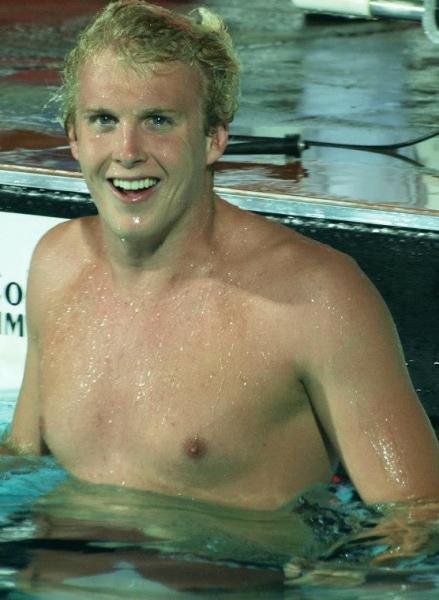
CI swimmer clocks commonwealth qualifying time
 (CNS): CARIFTA Champion and Island Games Medallist, Geoffrey Butler swam to a Commonwealth Games Qualifying time in the 1500m freestyle at the ASA National Youth Championships in Sheffield last week. Butler perfectly paced the 30 lap race and set a lifetime best of 16:13.12, only 2.4 seconds outside the CIASA record, and swam well inside the Commonwealth Games Qualifying Standard of 16:22.49. This should guarantee the young swimmer a place in the Cayman team for the games, which take place in Glasgow, Scotland, next year.
(CNS): CARIFTA Champion and Island Games Medallist, Geoffrey Butler swam to a Commonwealth Games Qualifying time in the 1500m freestyle at the ASA National Youth Championships in Sheffield last week. Butler perfectly paced the 30 lap race and set a lifetime best of 16:13.12, only 2.4 seconds outside the CIASA record, and swam well inside the Commonwealth Games Qualifying Standard of 16:22.49. This should guarantee the young swimmer a place in the Cayman team for the games, which take place in Glasgow, Scotland, next year.
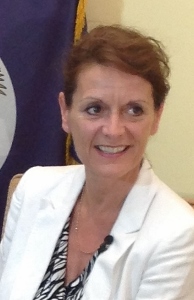
Lack of diplomatic experience won’t hinder governor
 (CNS): The departing governor does not think that his successor’s lack of diplomatic or foreign office experience will hinder her in the job she is set to take up next month, he told members of the press last week. Helen Kilpatrick, who will taking over Duncan Taylor's position as the Cayman Islands governor, comes to the job from the UK’s Home Office. Kilpatrick has a career history in local government and home affairs and is a finance expert who has never served overseas in the diplomatic core or worked in the Foreign and Commonwealth Office. However, Taylor said that the post of governor is very different from the usual diplomatic positions and Kilpatrick’s experience will help her in the new job.
(CNS): The departing governor does not think that his successor’s lack of diplomatic or foreign office experience will hinder her in the job she is set to take up next month, he told members of the press last week. Helen Kilpatrick, who will taking over Duncan Taylor's position as the Cayman Islands governor, comes to the job from the UK’s Home Office. Kilpatrick has a career history in local government and home affairs and is a finance expert who has never served overseas in the diplomatic core or worked in the Foreign and Commonwealth Office. However, Taylor said that the post of governor is very different from the usual diplomatic positions and Kilpatrick’s experience will help her in the new job.
The outgoing governor, who leaves Cayman on Wednesday after his three and a half year tour of duty, said that while his career with the FCO might have been helpful, his previous career was not necessarily “a dress rehearsal for the job I did here”, noting that diplomats can only try to influence but have no powers in the countries where they are stationed.
By contrast, Taylor said, the job of governor had significant powers and responsibilities and Kilpatrick’s career history managing local government budgets and overseeing the administration of police forces and other such jobs at the Home Office would stand her in good stead.
While there will be some adjustments, the skills and core competencies in the job Kilpatrick has most recently held will be similar to the skills she will be using in Cayman, he said. Taylor suggested that one of the major adaptions for his successor will be her move from London and her role managing a massive budget to a small Caribbean jurisdiction.
Kilpatrick is the first governor to come to Cayman that is not a diplomat and who has no overseas experience. She is however, a financial expert and has wide experience working with public finances and managing large government sector budgets. With the evolution over the years of the UK’s civil service and the introduction of competition, the governor’s posts in the UK’s remaining territories are no longer given by appointment but through an open interview and a selection process.
Speaking to the press when she came to Cayman for a brief familiarisation visit last month, Kilpatrick was also confident that she would have the skills required. However, she acknowledged that her first priority would be to listen and learn.
Taylor agreed with that and said it was something that all incoming governors must do to understand the issues before them and understand the environment in which they will be working before making decisions. He said the post was a privilege to hold, with significant responsibility, and it was the duty of a governor to remember the importance of that.
He said that the issue which would remain for Kilpatrick was the same he faced, which was ensuring good governance, and he believed that she would be well-placed to build on the work already done in that area.

Climate change fastest since dinosaurs
 (CNS): New research report by two Stanford climate scientists has found that the planet is undergoing one of the largest climate changes since the dinosaurs were extinct and the speed of change is accelerating according to a press release from the Standford Woods Institute for the Environment. The scientists warn that the likely rate of change over the next century will be at least ten times quicker than any climate shift in the past 65 million years. Without intervention, this extreme pace could lead to a 5- to 6-degree Celsius spike in annual temperatures by the end of the century.
(CNS): New research report by two Stanford climate scientists has found that the planet is undergoing one of the largest climate changes since the dinosaurs were extinct and the speed of change is accelerating according to a press release from the Standford Woods Institute for the Environment. The scientists warn that the likely rate of change over the next century will be at least ten times quicker than any climate shift in the past 65 million years. Without intervention, this extreme pace could lead to a 5- to 6-degree Celsius spike in annual temperatures by the end of the century.
“If the trend continues at its current rapid pace, it will place significant stress on terrestrial ecosystems around the world, and many species will need to make behavioral, evolutionary or geographic adaptations to survive,” the scientists claim.
The findings come from a review of climate research by two Stanford Woods Institute Senior Fellows, Noah Diffenbaugh, an associate professor of environmental earth system science, and Chris Field, a professor of biology and environmental earth system science and the director of the Department of Global Ecology at the Carnegie Institution. The work is part of a special report on climate change in the current issue of Science.
"We know from past changes that ecosystems have responded to a few degrees of global temperature change over thousands of years," said Diffenbaugh. "But the unprecedented trajectory that we're on now is forcing that change to occur over decades. That's orders of magnitude faster, and we're already seeing that some species are challenged by that rate of change."
Diffenbaugh and Field also reviewed results from two dozen climate models to describe possible climate outcomes from present day to the end of the century. In general, extreme weather events, such as heat waves and heavy rainfall, are expected tobecome more severe and more frequent.
By the end of the century, should the current emissions of greenhouse gases remain unchecked, temperatures over the northern hemisphere will tip 5 to 6 degrees C warmer than today's averages. In this case, the hottest summer of the last 20 years becomes the new annual norm.
"It's not easy to intuit the exact impact from annual temperatures warming by 6 C," Diffenbaugh said. "But this would present a novel climate for most land areas. Given the impacts those kinds of seasons currently have on terrestrial forests, agriculture and human health, we'll likely see substantial stress from severely hot conditions."
The more dramatic changes that could occur by the end of the century, however, are not written in stone. There are many human variables at play that could slow the pace and magnitude of change – or accelerate it.
"There's no question that a climate in which every summer is hotter than the hottest of the last 20 years poses real risks for ecosystems across the globe," Diffenbaugh said. "However, there are opportunities to decrease those risks, while also ensuring access to the benefits of energy consumption.

‘Jealousy’ was murder motive
(CNS): The man accused of shooting and killing 23-year-old Jackson Rainford stood trial before a jury Monday when the crown opened its case against him in Grand Court. Tareek Ricketts (22) is charged with the murder, which took place in George Town on 16 December last year. Billed as a crime of anger and jealousy, the crown claims that Ricketts killed Rainford because he was angry that the mother of his children was in a relationship with him and that his new partner was Ranford’s ex-wife. However, Ricketts has denied being the gunman who opened fire on Rainford.
Rainford was shot twice, once in the head and once in the chest, when the car he was in was parked in Printer’s Way off Sheddon Road on the night of the murder. Witnesses claim that Ricketts, who was wearing a dark hoody, approached the car and firedthrough the passenger window, killing the 23 year old Jamaican national.
The trial continues in Grand Court 1.
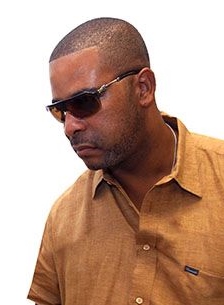
Misick’s brother denies plea bargain for political dirt
 (CNS): Former Turks and Caicos Islands premier Michael Misick has reportedly dismissed regional reports that the was in plea bargain negotiations with the American authorities and TCI’s Special Investigation and Prosecution Team (SIPT), using his alleged knowledge of wrongdoing by other politicians in the region, including Cayman, as leverage. In a letter to his brother, Phillip Misick, written on 1 August from his Brazilian jail cell, the former premier described the allegations as "bull s!!t". According to the TCI Sun newspaper in TCI, Misick claimed the allegations were designed to further destroy him and that he has had no talks with UK or US officials.
(CNS): Former Turks and Caicos Islands premier Michael Misick has reportedly dismissed regional reports that the was in plea bargain negotiations with the American authorities and TCI’s Special Investigation and Prosecution Team (SIPT), using his alleged knowledge of wrongdoing by other politicians in the region, including Cayman, as leverage. In a letter to his brother, Phillip Misick, written on 1 August from his Brazilian jail cell, the former premier described the allegations as "bull s!!t". According to the TCI Sun newspaper in TCI, Misick claimed the allegations were designed to further destroy him and that he has had no talks with UK or US officials.
Phillip Misick told the TCI Sun that "British operatives” were continuing to spread propaganda and lies about his brother.
"What a lot of people don't know is that Mike was re-arrested because the British and the SIPT lied to the Brazilian authorities and told them that Mike has applied to Argentina for political asylum and was considering going there,” Philip Misick told the Sun. “That was not true at all, but that was the reason why they denied his asylum appeal. The Brits and SIPT did that; just like how they lied to the Brazilian authorities by telling them that Mike was charged in the Turks and Caicos Islands and skipped the country, when up to this day he has not been charged with a single offence," he added.
Misick, who is awaiting the outcome of extradition hearings regarding alleged government corruption during his time as TCI’s leader, said he was waiting for a court date for his case to be decided. He was arrested in Rio de Janeiro in 7 December 2012 while trying to board a plane after an Interpol warrant was issued. Misick is wanted for questioning by the SIPT team in relation to the ongoing investigation that arose from a commission of inquiry in 2009, but he has not yet been charged with any offence.
Phillip Misick denied the reports of a plea bargain saying his brother had not even “been approached by them” and he has no information that he has done anything wrong in America.
Related article on CNS: